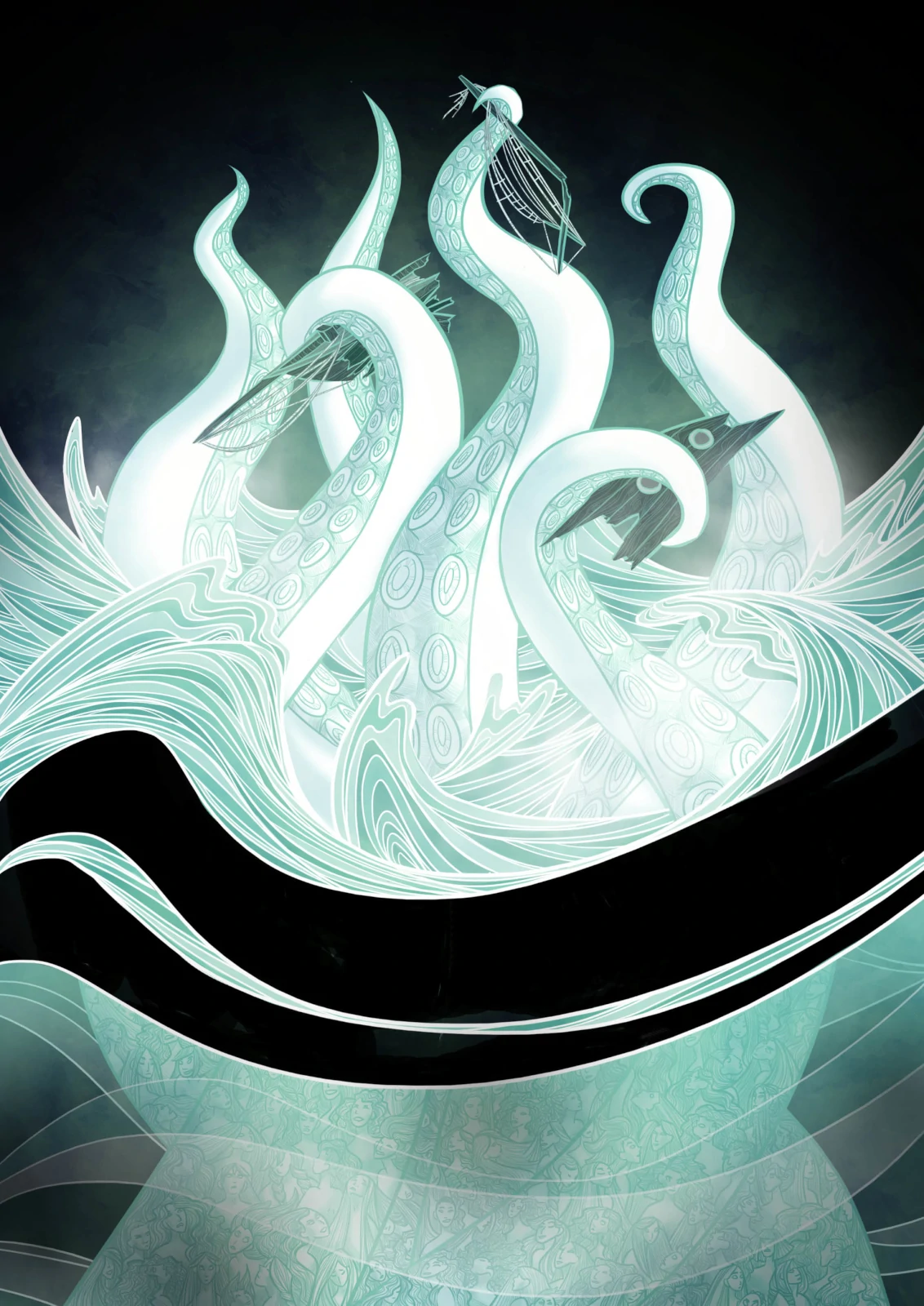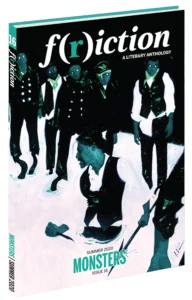
Colossal
Words By Tara Laskowski, Art By Samantha Dow
After my husband discovered my lover and she fled town, the town declared me damned, fish food for Kraken. I was not asked to defend myself, not that I needed to. The men did not offer a final meal, but I’d had a decadent last dinner regardless—a rich lamb chop stew, cooked by my lover just before we’d been caught. She had wiped the corners of my mouth with her napkin before kissing me. It was that memory I chewed on when they forced me onto a ship.
They told my husband he did not have to make the journey to the squid that the men all feared and worshiped, but he said he needed to see me die for himself. It was his cleansing. His retribution. He was, like all the other wronged men before him, willing to risk it all to see my pain.
He stood beside me, anxious, staring not at my face but at the heavy, damp ropes bound around my wrists, my thighs, my ankles. “You’d better run quickly, my dear,” I whispered, and laughed. “You know what happens to the ones who stay too long.” He unwrapped the ropes and tied them again, tighter this time, licking my blood from his fingers.
We sailed for an eternity, to the edges of nowhere, to the deepest of the ocean, to the middle of the end. When the ship finally drifted to a stop, bobbing like a child’s toy in a swimming pool, all I could smell was salt and rot. An eerie quiet. The men waited, poised with their guns, their eyes darting nervously.
And waited.
And then we heard it. A tremor, like the most devastating of earthquakes. An apocalyptic wail so overwhelming it washed the color from the men’s faces.
“She’s here,” I murmured, and my husband, the coward, backed away from me.
“Let’s go. Quickly!” another shouted, his lips trembling. For he knew what could happen if they lingered too long—if the husbands insisted on seeing it all. The greedy ones who thought their wives could satisfy the Kraken enough to spare the ship.
The men untied me, dragged me to the gunwale. They heaved me over the edge, trembling. “Kraken! Our gift.”
Down, down, down. I hit the icy water so fast it felt like my back had split open, that I had turned inside out. At first, the water was emerald green, the color of my lover’s eyes, but as I sunk further, the sea darkened, swallowing the sun. I drifted down, like hot wax, swelling and bulbing, nudging up against unseen things, a soft yielding here, a nip there.
The squid bellowed again. What had sounded chilling above, though, worked its way through me like a lullaby here in the depths. I saw nothing but her—a pulsating gray glow as colossal as a mountain, bulging and twisting in an impossible silence.
I did not try to get away. I found I did not want to. I opened my chest, slung my arms back, parted my legs. The squid contracted. Her tentacles, long, twitching, suddenly tensed like rubber bands. One whirled around me, wrapping. Hundreds of tiny sucking membranes fed on my cuts and burns. She rolled me toward her horrific, trembling mouth.
Then. Darkness.
When I woke, I was dead. When I woke, I was inside Kraken—no, I was Kraken. I could see through her large eyes, sense her loneliness and anger, feel her—our—drifting tentacles clench and unclench. I was Kraken and all those who came before me. I could see that child’s toy above us, its defiant dance on the surface. Could feel my husband’s self-righteous gaze. He believed he’d won—that he’d forever separated the two women who’d lain in a field of heather under a full moon.
I twitched.
Feast, I said and didn’t say. Destroy, I whispered and did not whisper. I trembled as we descended and I remembered all the things that would never be again—the way my lover’s backside warmed in a patch of sunlight through her bedroom window, the soft indented curve of her chin, the gentle lilt of her laugh.
It was then we stopped, suspended. We writhed—all the whores and bitches and mothers and harlots and lovers and teachers and scientists and witches and gypsies and sluts that had come before. Our pasts came back—the soft midnight whispers, the dangerous scent of sulfur on the sleeve of a laboratory coat, the children that were and never were.
Rise, we pleaded to Kraken, but she was already bellowing, already pushing up, up, up. The light green waters didn’t suit her, but her massive belly undulated with the rage of a thousand women.
We were the size of a city. We were the size of a small country. We were the size of all the nightmares of all the men in all their sweat-stained beds. A collective force of sadness and terror and beauty. Up we came, our tentacles slicing through the water, dwarfing the ship in shadow. The men screamed their man screams as we swept one of our feelers out and across, a terrific arc, snapping the mast like a toothpick. They couldn’t hear us, couldn’t hear the sweet song we sang as their cabins filled with seaweed and salt, as their bones began to break and their skin began to bleed, as the sharks began to circle. Oh boys, we sang and sang.
